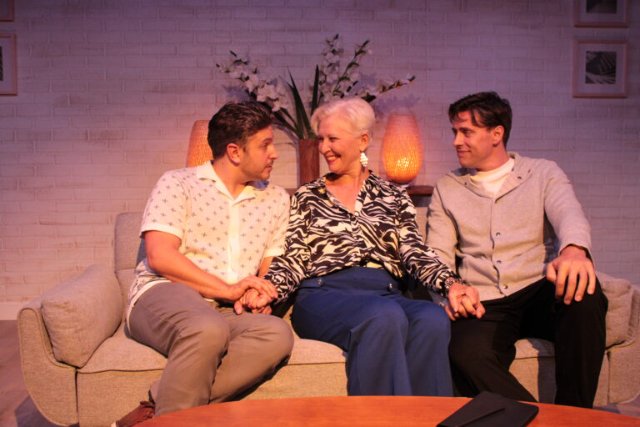Daniel's Husband
Co-production in South Florida
By: Aaron Krause - Jun 11, 2024
A misleading synopsis of Michael McKeever’s heart-shattering, tight, well-crafted drama, Daniel’s Husband, appears in the program for a current potent professional co-production in South Florida.
The synopsis reads that Mitchell, the titular character’s boyfriend, “doesn’t believe in gay marriage.” In fact, he doesn’t believe in the institution of marriage, period, whether the couple is gay or straight. However, Mitchell supports gays’ and lesbians’ constitutional right to marry one another.
Fortunately, the aforementioned comment amounts to just about the only blemish on an otherwise excellent co-production running through June 16 at the intimate Foundry space in Wilton Manors, near Ft. Lauderdale. The mounting is a collaboration between the nonprofit organizations Plays of Wilton and Ronnie Larsen Presents.
Nine years ago, Daniel’s Husband, which runs about 80 minutes without an intermission, experienced its world premiere at Island City Stage. The production captured three Carbonell Awards. Years later, the play became a hit Off Broadway.
Now, more Carbonell Awards, or at least nominations, are likely for the current South Florida co- production. It includes sensitive direction by McKeever and stars performers Jordon Armstrong, Ryan Didato, Robert Koutras, Barbara Sloan, and Kevin Veloz.
The actors demonstrate deft ensemble work and excel individually as well. In particular, the performers imbue their portrayals with nuance, subtlety, detail, variety, and always naturalism, even when they act intense. And the Foundry’s intimacy helps create a visceral live theatrical experience with emotions coming across powerfully.
The behind-the-scenes artists also mostly shine. They include McKeever, who, in addition to directing, designed the set. Meanwhile, Gabriel Gonzalez designed the lighting, the costume coordinator is Emma Garcia Seeger, and the sound designer is Stuart Meltzer. Mood-enhancing music also adds to the co-production’s quality.
This co-production may be the play’s most urgent since McKeever penned the piece. Indeed, not only is it Pride Month, but U.S. Supreme Court Justice Clarence Thomas has argued that the court “should reconsider” its past rulings codifying rights to, among other things, same-sex marriage. Thomas presented his argument after the court, in its Dobbs v. Jackson decision, overturned Roe v. Wade on June 24, 2022 – just about two years ago.
Daniel’s Husband isn’t a groundbreaking play. However, it’s a powerful and vital piece in which the prolific and versatile McKeever examines same sex marriage from a fresh angle.
In the play, Mitchell, an author of gay pulp novels, and Daniel, an architect, are a modern-day gay couple. They seem to have everything going for them. They’ve been together for seven years, deeply love each other, and share seemingly the perfect home. In addition, one of the most important women in their lives, Daniel’s mother, Lydia, wholeheartedly believes the couple should tie the knot. And Lydia seems to love Mitchell as much as she loves her own son.
But for various reasons that he mentions, Mitchell does not believe in marriage. Can’t he and Daniel simply live together knowing that they love each other with all their heart and soul till death do them part? Why do they need a marriage certificate?
McKeever, who skillfully blends powerful drama and observant comedy in his works, nicely balances lightheartedness with darkness in Daniel’s Husband. While this review will avoid spoilers, we’ll just say that something happens to reinforce the idea that life is fragile and fleeting. It also makes Mitchell reconsider his stance against marriage.
To McKeever’s credit, he doesn’t provide hints that darkness is about to overtake his play. Certainly, the play’s change in mood occurs suddenly yet seamlessly. A playwright can disarm an audience with comedy, and then hit them with serious drama or even tragedy later. That is exactly what McKeever accomplishes in Daniel’s Husband.
The first half or so of the piece is largely lighthearted and laid back. When the play opens, the couple is hosting friends for an evening of games, dinner, and dessert. For instance, the characters play “This or That.” (Jellybeans or Gummy Bears? Star Wars or Star Trek? Instagram or Twitter? Anderson Cooper or Don Lemon?)
During the first part of the play, McKeever also includes irresistible comic lines. For instance, one pokes fun at Mitchell’s agent, Barry (Armstrong) for dating a significantly younger man, Trip (Veloz). “If you’re 26, then he’s a fetus,” a character tells Barry.
A more darkly funny passage comes when Mitchell says, “my grandparents were married for something like 200 years. They got married, not because they were in love – but because they were ‘supposed to.’” The couple “followed the rules of their generation. They made a home and had children. And then one day when my grandmother was 78 years old, she stuck my grandfather in the neck with a knitting needle.”
In a stark contrast from the first part of the play’s lighthearted and laid-back aura, the piece turns dark after the unexpected happens. In fact, under McKeever’s deft direction, the tension and heat become as intense as what you might experience at a hotly-contested courtroom battle. And the atmosphere turns as somber as the aura in a hospital room or funeral home following an unexpected death.
While we may root for Mitchell, we believe Lydia and feel for her when she asserts, “I’m not the villain here.” Of course, Sloan’s performance as Lydia endears her to us. The performer radiates motherly affection, enthusiasm, and a genuine zest for life. Also, Sloan believably conveys vulnerability and anger during appropriate times. And, during at least one scene, Sloan places her hand over her heart. It’s a gesture that properly accentuates a heartfelt remark.
Meanwhile, Didato, appropriately leaning forward at times, lends Mitchell sincere and intense passion. The actor manages to be fiery without making his character unlikable. He’s simply a man of strong convictions. And, as Didato portrays him, we never doubt Mitchell’s intense love for Daniel. During quieter moments, Didato manages to be tender without becoming too sentimental. A strong chemistry exists between Didato and Koutras as Daniel. In addition to fondly speaking to each other, they embrace each other as real-life lovers would.
Speaking of Koutras, the actor does his best work toward the end. That is when he must rely on subtlety to believably convey his character’s emotions.
In supporting roles, Armstrong, with his expressive eyebrows and voice, makes Barry sympathetic and romantic. And Veloz charms as Trip.
As set designer, McKeever has created an orderly, spacious, elegant, detailed, and inviting depiction of Daniel and Mitchell’s home. The one knock on the set is that smudges of what resemble dirt grace the white wall. This is something that Daniel probably would not allow. Instead, he’d probably insist that someone clean the wall instantly. With colors such as white and darker hues, the set symbolizes the bright times and darker moments of life.
Seeger’s costumes are tasteful, as well as appropriately light and dark, symbolizing life’s ups and downs.
Gonzalez’s lighting is fittingly bright and realistic during many scenes and dimmer during contemplative ones. During soliloquies, a spotlight appropriately highlights the character speaking.
Undoubtedly, Daniel’s Husband highlights issues that are timely and timeless, such as family, love, commitment, and responsibility. Each time someone witnesses the play, they are liable to take something new away from their experience. That is the definition of a classic, and Daniel’s Husband has certainly become one


